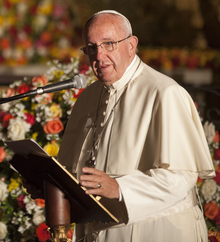Theology of Pope Francis
| Pope Francis | |
|---|---|
 |
|
| Papacy began | 13 March 2013 |
| Predecessor | Benedict XVI |
| Orders | |
| Ordination | 13 December 1969 by Ramón José Castellano |
| Consecration | 27 June 1992 by Antonio Quarracino |
| Created Cardinal | 21 February 2001 by John Paul II |
| Personal details | |
| Birth name | Jorge Mario Bergoglio |
| Born |
17 December 1936 Buenos Aires, Argentina |
| Nationality | Argentine with Vatican citizenship |
| Previous post |
Provincial Superior of the Society of Jesus in Argentina (1973–1979) Auxiliary Bishop of Buenos Aires (1992–1997) Titular Bishop of Auca (1992–1997) Archbishop of Buenos Aires (1998–2013) Cardinal-Priest of St. Roberto Bellarmino (2001–2013) Ordinary of the Ordinariate for the Faithful of the Eastern Rites in Argentina (1998–2013) President of the Argentine Episcopal Conference (2005–2011) |
| Motto |
Miserando atque Eligendo Mercifully choosing him |
| Signature | |
| Coat of arms |  |
Theology of Pope Francis is an analysis of his significant words and actions which indicate his personal understanding of Christian beliefs and practices. The focus here is on salient features, what he emphasized during his papacy, what marked off his pontificate as special or different. And the focus is on his papacy, as distinguished from his time as Jesuit provincial or as archbishop in a very special Latin American context.
Pope Francis is the first member of the Society of Jesus to be appointed Pope of the Catholic Church, elected on 13 March 2013. With training as a Jesuit educator, he received "high marks as an accomplished intellectual, having studied theology in Germany". He can be seen as someone who personally straddles the divide between the liberals and conservatives in the Catholic Church. At the same time, he has consistently supported the social justice ethos of Latin American Catholicism, including a robust defense of the poor.
As pope he has become known for his emphasis on God's merciful love for all people, regardless of religious belief, and for intolerance of triumphalism and smugness in the Church. These emphases emerge from the various sections in this article, on the Church's mission and leadership, on its pastoral sense and liturgy, and on charity as the foundation for morality and as motivation for environmentalism today.
The apostolic exhortation Evangelii Gaudium released eight months after his election has been described as his programmatic, "a core document of this pontificate", in his own words "pointing new paths for this pontificate for years to come", as verified by his later words and actions. Intext citation numbers in this article apply to paragraph numbers in Evangelii Gaudium.
Chapter One of Evangelii Gaudium is entitled “The Church’s Missionary Transformation”. In the opening paragraph Francis proposed “pointing out new paths for the Church’s journey for years to come”. He emphasized: "Missionary outreach is paradigmatic for all the Church’s activity” (15) and it is “the entire People of God which evangelizes” (17). In virtue of their baptism, all the members of the People of God have become missionary disciples (120). And he was addressing all Christians when he said:
...
Wikipedia
